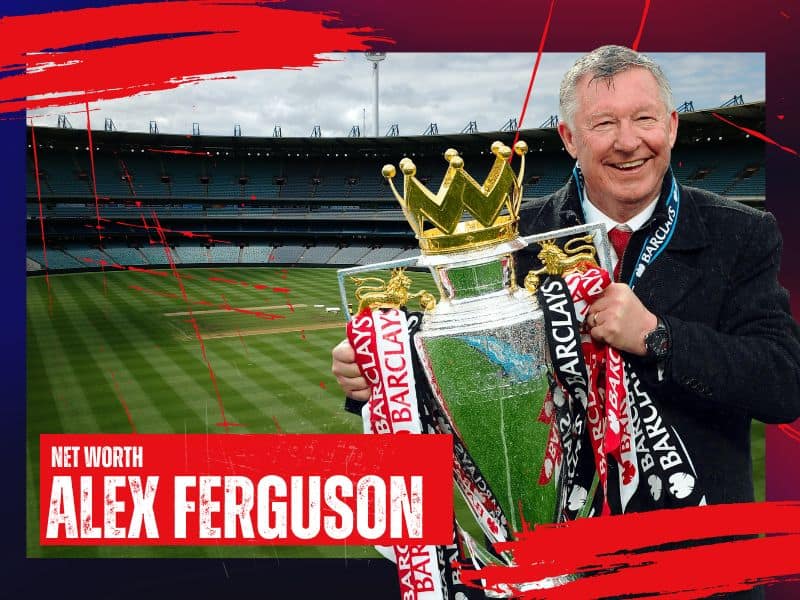Sir Alex Ferguson’s net worth in 2024 remains a point of interest for many. Discover how his post-retirement earnings and investments continue to grow.
Let FC Bayern Net Worth guide you through the financial journey of this legendary football manager.
Sir Alex Ferguson Quick Facts
| FACT | DETAIL |
|---|---|
| Real Name | Alexander Chapman Ferguson |
| Popular Name | Sir Alex Ferguson |
| Gender | Male |
| Birth Date | December 31, 1941 |
| Age | 82 years |
| Parents | Alexander Beaton Ferguson, Elizabeth Hardie Ferguson |
| Siblings | Martin Ferguson |
| Birthplace | Govan, Glasgow, Scotland |
| Nationality | scottish |
| Education | Govan High School |
| Marital Status | Married |
| Wife/Spouse | Cathy Ferguson (m. 1966–2023) |
| Children | Darren Ferguson, Jason Ferguson, Mark Ferguson |
| Net Worth | $70 million – $75 million |
| Source of Wealth | Football management, Investments, Book Sales |
| Position(s) | Centre-Forward |
| Height | 1.8 m |
| Current Club | Retired (former player) |
| Joined | Jul 1, 1974 |
| Avg. term as coach | 7.98 Years |
| Coaching Licence | UEFA Pro Licence |
| Club & role | UEFA Match Analyst |
| Appointed | 13/14 (Jan 24, 2014) |
| In charge until | 15/16 (Jun 30, 2016) |
| Current Team | Retired (former football manager) |
| Youth Career | Harmony Row Boys Club Drumchapel Amateurs |
| Senior Career | 1957–1960: Queen’s Park (31 apps, 15 gls) 1960–1964: St Johnstone (37 apps, 19 gls) 1964–1967: Dunfermline Athletic (89 apps, 66 gls) 1967–1969: Rangers (41 apps, 25 gls) 1969–1973: Falkirk (95 apps, 37 gls) 1973–1974: Ayr United (24 apps, 9 gls) |
| International Career | 1960: Scotland Amateurs (1 apps, 1 gls) 1967: Scotland (4 apps, 3 gls) 1967: Scottish Football League XI (2 apps, 1 gls) |
| Managerial career | 1974: East Stirlingshire 1974–1978: St Mirren 1978–1986: Aberdeen 1985–1986: Scotland 1986–2013: Manchester United |
| Medal Record | Scottish League Titles, UEFA Cup Winners’ Cup, etc. |
What is the Net Worth Of Sir Alex Ferguson in 2024?
As of 2024, Sir Alex Ferguson’s net worth is estimated to be between $70 million and $75 million. This wealth is a result of his storied career and smart post-retirement investments.
When comparing his financial success to other figures in related fields, it’s clear that his influence extends beyond the pitch.
What is the Salary/Income of Sir Alex Ferguson in 2024?
Sir Alex Ferguson reportedly earns around £235,000 per week, translating to a substantial annual income, primarily due to his ambassadorial role at Manchester United, among other ventures. His total revenue for 2024 is projected to be £12.2 million.
Alex Ferguson Overview
A legendary Scottish football manager, Sir Alex Ferguson, led Manchester United from 1986 to 2013. Renowned for his success, he won 38 trophies, including 13 Premier League titles and two UEFA Champions League titles.

Before United, he managed Aberdeen to numerous victories and briefly managed Scotland. Known for valuing youth, especially the “Class of ’92,” he was knighted in 1999. Ferguson is Manchester United’s longest-serving manager, retiring in 2013 after winning the Premier League in his final season.
Early life
Alexander Chapman Ferguson was born on December 31, 1941, in Glasgow. He grew up in a tenement on Govan Road with his parents and younger brother, Martin. Ferguson attended Broomloan Road Primary and Govan High School.
He started his football career with Harmony Row Boys Club and Drumchapel Amateurs while working as a toolmaker apprentice.
Playing career
Sir Alex Ferguson began his playing career at 16 with Queen’s Park, scoring 20 goals in 31 games. He then moved to St Johnstone, Dunfermline, and Rangers, where he set a record transfer fee between Scottish clubs.
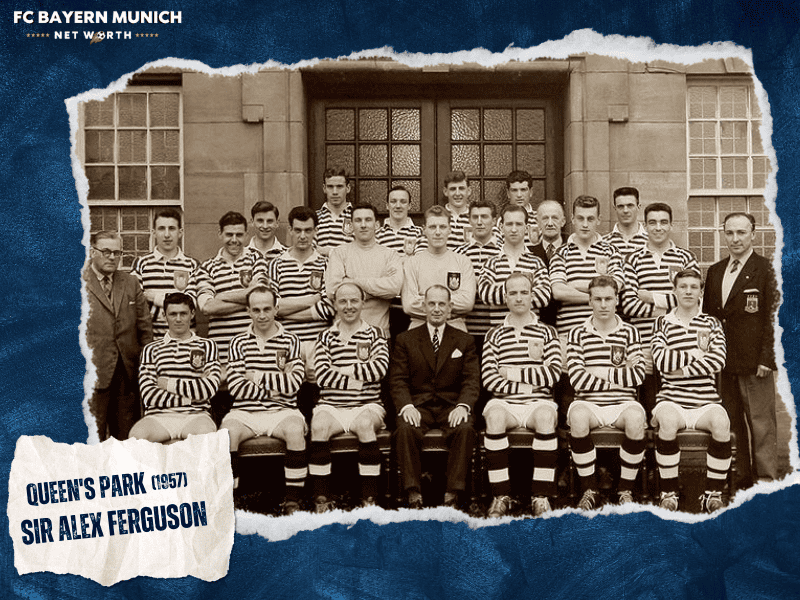
Known for his scoring prowess, he netted 45 goals in Dunfermline’s 1965-66 season. Despite success in Europe, his time at Rangers was marred by controversy.
He later played for Falkirk, becoming a player-coach, and finished his career at Ayr United in 1974. Ferguson’s only international cap came from a reclassified 1967 tour match recognized by the SFA in 2021.
Financial Overview of His Managerial Career
Early Career: East Stirlingshire and St Mirren
Alex Ferguson began his managerial journey at East Stirlingshire in June 1974, earning £40 weekly. His tenure was short-lived, but it set the stage for his move to St Mirren in October 1974, where he transformed the club from a lower division team to First Division champions by 1977.
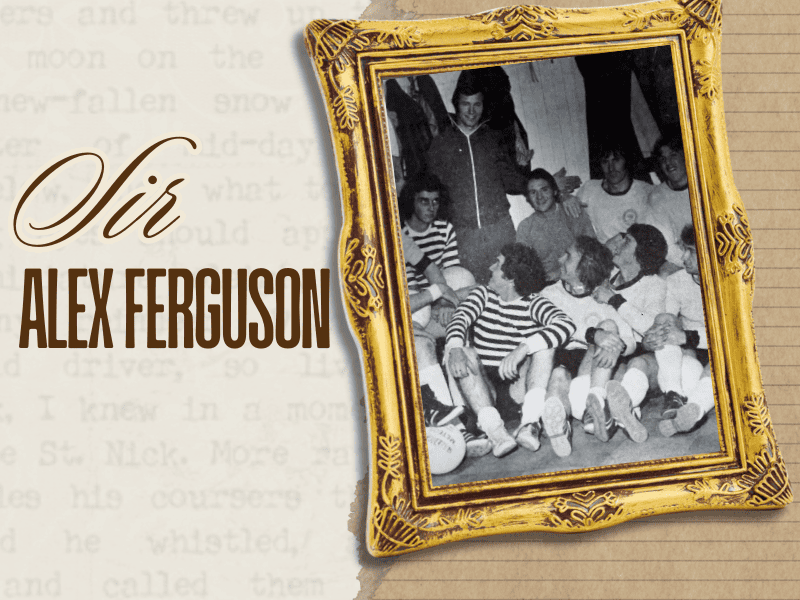
Despite this success, Ferguson’s contract at St Mirren ended controversially when he was dismissed in 1978, with allegations of breaches related to unauthorized payments and intimidating behavior towards staff.
The incident ultimately led to an industrial tribunal, which ruled against him.
Aberdeen: The Turning Point
Ferguson’s next significant role was in Aberdeen, starting in June 1978. He was initially offered a modest salary, but his financial worth increased as he led the club to unprecedented success, including winning the Scottish League title in 1980 and the European Cup Winners’ Cup in 1983.

His managerial prowess attracted attention, and he reportedly turned down lucrative offers from clubs like Wolverhampton Wanderers and even the Scottish national team to remain at Aberdeen, stating his ambition was not yet fulfilled.
During his time at Aberdeen, Ferguson’s salary grew, reflecting the club’s success and his growing reputation. In 1985, he earned an OBE for his contributions to Scottish football, further solidifying his status.
Manchester United: A New Era
Ferguson’s real financial breakthrough came when he joined Manchester United in November 1986. His initial salary was around £500,000 yearly but increased significantly as his successes mounted. Under his guidance, United became one of the wealthiest clubs globally.
In the 1990s, Ferguson’s financial decisions included high-profile signings like Eric Cantona for £1.2 million and Roy Keane for a British record fee of £3.75 million.
His ability to negotiate contracts with players and manage transfer budgets was instrumental in building a successful team that dominated English football.
By the late 1990s, Ferguson’s financial management had transformed United into a commercial powerhouse.
The club’s revenues skyrocketed thanks to lucrative sponsorship deals and matchday earnings, with Ferguson’s managerial achievements directly contributing to this financial growth.
In a landmark moment for the club, Ferguson led Manchester United to a treble in the 1998-99 season, which dramatically increased the club’s marketability and revenue streams.
Following this success, his salary reportedly reached £4 million per year, making him one of the highest-paid managers in football.
Contracts and Transfers
Ferguson’s approach to transfers often involved nurturing young talent and making strategic signings. His legendary youth academy produced talents like Ryan Giggs, Paul Scholes, and the Neville brothers, helping maintain a competitive edge without excessive spending on transfers.
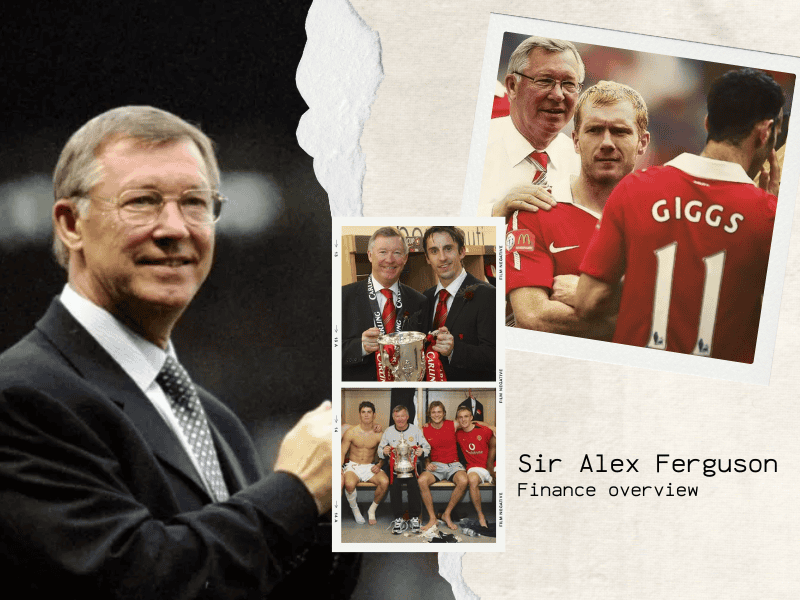
However, he was not afraid to invest heavily when necessary, as seen with the signing of Ruud van Nistelrooy for £19 million.
Ferguson’s contract negotiations also extended beyond player acquisitions. In 2001, he faced scrutiny regarding his contract as tensions rose between him and the club’s board over transferring funds.
This culminated in a compromise that allowed him to remain at the helm while ensuring financial backing was provided for future transfers.
Retirement and Legacy
Upon retiring in May 2013, Ferguson left behind a legacy of footballing success and financial acumen. At his retirement, Manchester United had become one of the most valuable sports franchises globally, with an estimated worth exceeding $3 billion.
Ferguson’s post-retirement ventures included writing books and serving as a consultant and ambassador for UEFA, further enhancing his financial portfolio.
His influence on football management has been studied extensively, highlighting his unique approach to blending sporting success with sound economic practices.
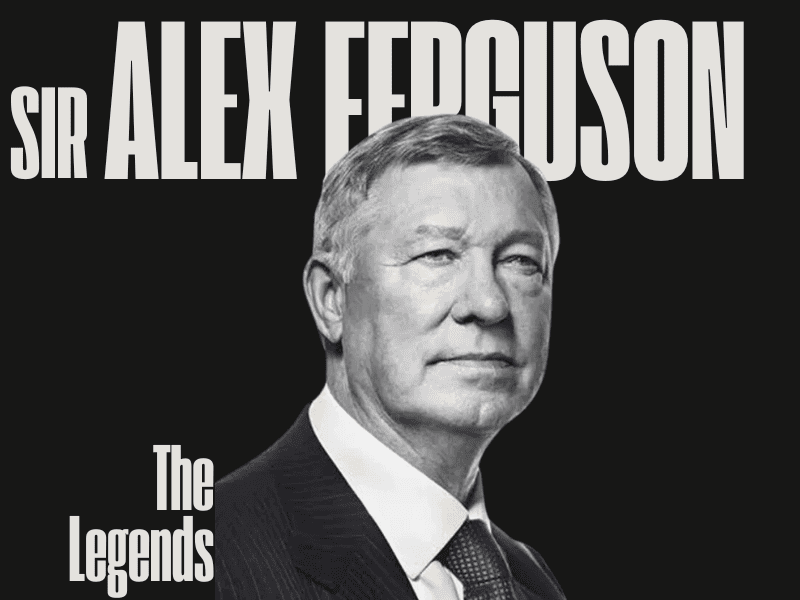
In summary, Alex Ferguson’s managerial career is marked by astute financial decisions that transformed clubs financially while achieving remarkable sporting success.
His ability to navigate contracts, player transfers, and salary negotiations made him a formidable force in football management and left an indelible mark on the sport’s financial landscape.
Controversies
Gordon Strachan
Gordon Strachan, a key player for Ferguson at Aberdeen, had a falling out with him when Strachan secretly signed an agreement with FC Köln.
Ferguson felt betrayed and later sold Strachan to Leeds United in 1989. Strachan thrived at Leeds, winning the 1991–92 English league championship.
Their relationship remained strained, with Ferguson stating in his autobiography that Strachan “could not be trusted an inch.” However, by 2006, they seemed to have reached a truce.
David Beckham
In February 2003, Ferguson had a heated argument with David Beckham in the dressing room. During the altercation, Ferguson accidentally kicked a football boot that struck Beckham’s face, causing a minor injury. Beckham was transferred to Real Madrid later that year.
Champions League Draw Fixing
On April 5, 2003, Ferguson accused UEFA of fixing the Champions League draw favoring Spanish and Italian teams.
His comments led to a fine of 10,000 Swiss francs (£4,600) for bringing the game into disrepute.
Rock of Gibraltar
2003 Ferguson sued Manchester United shareholder John Magnier over stud rights for the racehorse Rock of Gibraltar. Magnier counter-sued and questioned Ferguson’s transfer dealings. The case was eventually settled out of court.
BBC
Ferguson boycotted the BBC after a 2004 documentary portrayed his son Jason negatively. Despite new Premier League rules in 2010 requiring interviews with the BBC, Ferguson continued his boycott until August 2011, when he finally agreed to meet with BBC officials and end the dispute.
Referees
Ferguson often faced punishments for abusing and criticizing referees. Notable incidents include:
- October 20, 2003: Two-match touchline ban and £10,000 fine for abusing fourth official Jeff Winter.
- December 14, 2007: Two-match touchline ban and £5,000 fine for abusing Mark Clattenburg.
- November 18, 2008: Two-match touchline ban and £10,000 fine for confronting Mike Dean.
- November 12, 2009: Four-match touchline ban and £20,000 fine for comments on Alan Wiley’s fitness.
- March 16, 2011: Five-match touchline ban and £30,000 fine for questioning Martin Atkinson’s fairness.
‘Fergie Time’
Ferguson’s influence allegedly led to “Fergie Time,” where generous injury time was added when Manchester United were behind.
This concept gained attention when Steve Bruce scored a last-minute goal in April 1993, helping United secure a league win. The term gained further popularity after United’s dramatic comeback to win the 1999 UEFA Champions League final with two goals in injury time.
Legacy
Sir Alex Ferguson’s legacy in football is immense. His former players have become managers, including notable names like Ryan Giggs, Ole Gunnar Solskjær, and Michael Carrick, who have all managed Manchester United. Ferguson’s term “squeaky-bum time” is now part of the Collins and Oxford English Dictionaries.
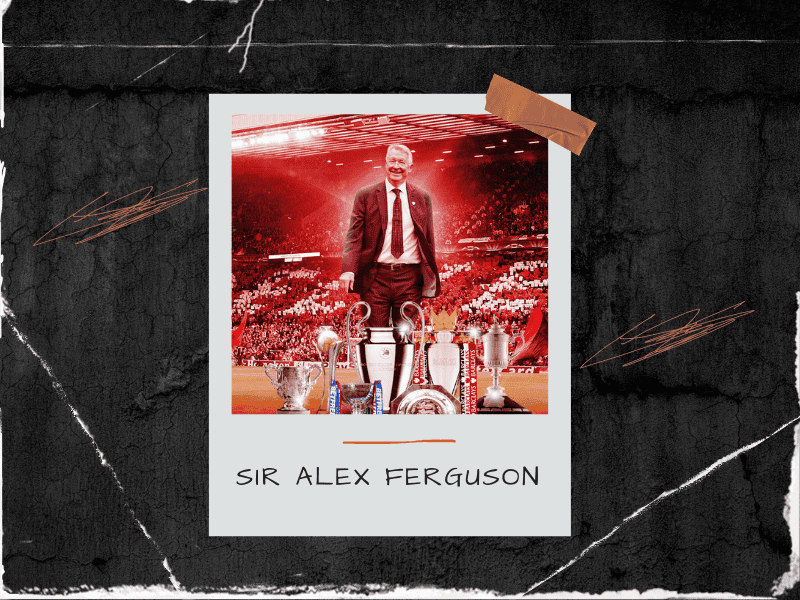
Honoring his contributions, a bronze statue by Philip Jackson was unveiled at Old Trafford in 2012, and Aberdeen revealed another statue in 2022. A road near Old Trafford was renamed Sir Alex Ferguson Way in 2013.
His life and career were documented in “Sir Alex Ferguson: Never Give In,” released in UK cinemas and on Amazon Prime Video in 2021.
This documentary features interviews with Ferguson, his family, doctors, and former players, providing a deep insight into his storied career.
Personal life
Sir Alex Ferguson resides in Wilmslow, Cheshire. He was married to Cathy Holding from 1966 until her passing in October 2023, and they have three sons: Mark, Darren, and Jason.
Darren followed in his father’s footsteps as a professional footballer and manager, while Jason directed the documentary “Sir Alex Ferguson: Never Give In.” A dedicated supporter of the Labour Party, Ferguson is a self-described socialist and was named a top financial donor in 1998.
In retirement, Ferguson engages in public speaking and charity work, serves as an ambassador for Manchester United, and is a patron of Harmony Row, his childhood team.
Ferguson supported Scotland remaining in the UK during the 2014 independence referendum. After surviving a brain hemorrhage in 2018, he made a full recovery.
An avid wine collector, Ferguson auctioned part of his collection in 2014, fetching £2.2 million from 229 lots.
Real Estate
Alex Ferguson, the owner of a 2.3-million-pound residence in Cheshire, England, was at the center of a media storm due to concerns over his neighbor’s development plans.
The neighbors intended to construct an expansive mansion, which Ferguson believed would infringe upon his property and adversely impact his quality of life.
Following an intense legal dispute, the local council approved the neighbor’s plans in 2020, much to Ferguson’s dismay.
Honors
Sir Alex Ferguson, one of the most successful football managers, led Manchester United to 13 Premier League titles, 5 FA Cups, and 2 UEFA Champions League trophies.
He also achieved notable success with Aberdeen, winning the Scottish Premier Division three times. Ferguson was the first manager to win three consecutive English league titles twice and managed the most games in the UEFA Champions League (190).
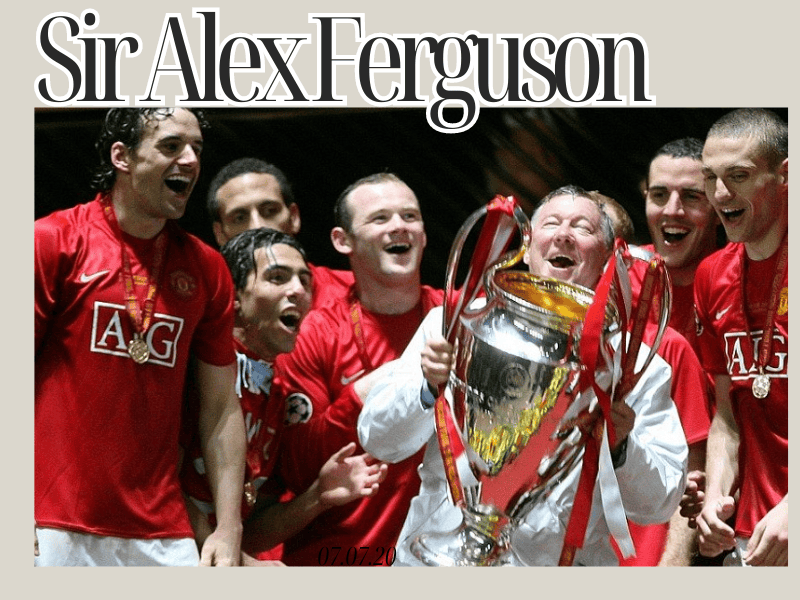
Ferguson’s legacy in football is unparalleled. He has been honored with numerous awards, including a knighthood in 1999. He has also been inducted into multiple halls of fame and received lifetime achievement awards for his sports contributions.
FAQs about Alex Ferguson
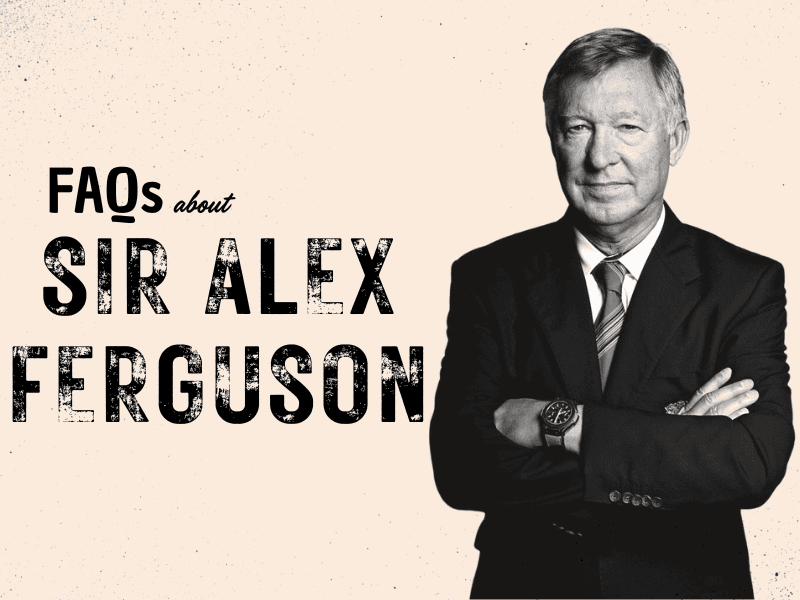
How much does Alex Ferguson earn now?
The report indicates that Ferguson’s personal companies have experienced a significant increase in value, reaching £40 million. Remarkably, he earned £12.2 million in the past year alone. According to the latest figures from his ACF Sports Promotions company, which handles all his commercial payments, assets rose from £17.5 million to £26 million in 2021.
Who is better, Pep or Ferguson?
Ferguson still boasts a more extensive collection of silverware than Guardiola, having accumulated 48 top-flight trophies throughout his 34-year managerial career at Aberdeen and Manchester United. In contrast, the Catalan has already secured 38 titles in just 15 seasons.
How much did Rangers pay for Alex Ferguson?
During the 1965–66 season, Ferguson impressively scored 45 goals in 51 appearances for Dunfermline. Alongside Joe McBride of Celtic, he emerged as the leading goalscorer in the Scottish league, each netting 31 goals. Subsequently, Ferguson transferred to Rangers for a fee of £65,000, setting a record for the highest transfer fee between two Scottish clubs.
How did Alex Ferguson make his money?
The Glasgow-born icon has accrued substantial wealth through book deals, personal appearances, and public speaking engagements. Additionally, a documentary detailing his life premiered last year. According to the latest financial statements from his company, ACF (Alexander Chapman Ferguson) Sports Promotions, the firm boasts total assets amounting to £27.2 million.
How much money did Sir Alex Ferguson spend?
In August 2023, Sky Sports released a table showing that, when adjusted for inflation, Sir Alex Ferguson was the highest-spending manager in Premier League history, with expenditures totaling £3.5 billion.
How much does Alex earn on the one show?
Alex reportedly earns a substantial annual salary from the BBC, ranging between £400,000 and £449,000. She also benefits from various endorsements that further enhance her financial standing.
How many trophies has Sir Alex won?
During his tenure at Manchester United, Sir Alex Ferguson secured an impressive total of 38 major trophies. These accolades include:
- 2 European Cups
- 13 Premier League titles
- 5 FA Cups
- 4 League Cups
- 1 European Cup Winners’ Cup
- 1 European Super Cup
- 1 Intercontinental Cup
- 1 FIFA Club World Cup
What age did Ferguson retire?
It was the story that shook the football world: Sir Alex Ferguson’s bombshell decision to retire as Manchester United manager at the age of 71. After an illustrious 26-and-a-half-year tenure at Old Trafford, Ferguson stepped down after securing his 13th league title and accumulating 38 trophies.
How much does Alex Ferguson still earn?
Despite having retired nearly nine years ago as the Manchester United manager, Sir Alex Ferguson is reportedly earning £235,000 per week. At 80 years old, the legendary coach continues to receive this substantial weekly income through a combination of investments, a book deal, public appearances, and his ambassador role at Old Trafford.
Conclusion
Sir Alex Ferguson’s financial success continues to be as legendary as his football career. To delve deeper into his financial journey, leave a comment, share this article, or explore more on FC Bayern Net Worth.
I’m Archie Rhind-Tutt, a sports correspondent for ESPN, specializing in German soccer, particularly the Bundesliga. My reporting brings in-depth analysis and engaging storytelling to a global audience. Additionally, I author FC Bayern Net Worth (fcbayernnetworth.com), a website similar to Celebrity Net Worth but focused exclusively on football players. There, I explore and analyze the financial aspects and net worth of football stars, providing insights into their earnings and financial decisions. My expertise in sports finance allows me to deliver detailed and compelling content for readers interested in the economic intricacies of the football world.
